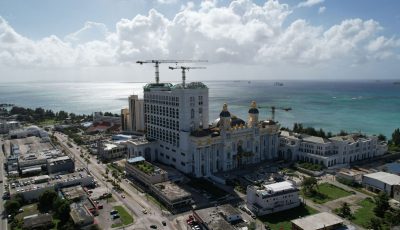How to build a better community
In the summer of 2013, as I was preparing to leave Saipan for graduate school, I remember feeling hopeful for the future of our Marianas. We had just emerged from a dark period marked by abuses of power by the Commonwealth’s highest officials, and it seemed as though a citizen-driven movement for honest, effective government was blossoming.
To recap recent history: in 2009, the Open Government Act was reapplied to the Legislature, thanks to overwhelming voter support for the popular initiative that made that happen, and despite fierce resistance from some lawmakers at the time. From 2010 to 2013, citizens began to openly challenge abuses of executive power that were coming under increasing scrutiny in the media and in the legislative chambers. One brave lady stood outside her house with a handwritten cardboard sign that read, “Honk…Impeach.” Her solitary act inspired many others to speak up. Rallies in the streets, letters to the editor, protests on social media, and testimonies at legislative proceedings eventually culminated in the historic impeachment and resignation of the Governor in early 2013.
In the midst of this political tumult, the Office of the Public Auditor was conducting an investigation that led to criminal charges against the governor, attorney general, and other law enforcement officials who had been implicated in conspiracies involving theft of services, misconduct in public office, and obstruction of justice. A special prosecutor was appointed by the court to handle these cases after it was determined that the entire Office of the Attorney General was conflicted out. The conflict stemmed from the use of OAG resources and personnel to provide legal defense to the public officials accused of crimes. Ultimately, the governor, attorney general, deputy police commissioner, and ports police chief were convicted.
In the summer of 2013, I remember thinking that as citizens we had learned some hard lessons from the years before—how corruption hurts all of us, how it robs us of public resources, and erodes our trust and sense of security. We had seen, too, how complacency feeds corruption, and what a difference courage can make in changing course. Perhaps, I thought, after what we had just been through, a new era of sunlight in our government could begin.
So what happened instead in the months and years that followed was dismaying for me to read about from afar—and even more so, I am sure, for the people at home who continued the good fight to hold our leaders accountable for their actions.
For example, in late 2013, according to media reports, several of our elected officials went on casino “fact-finding” trips to Hong Kong and Macau that were arranged and funded by prospective casino investors. These government officials returned to the Marianas and were instrumental in the fast-tracking of casino legalization on Saipan. They did so within a few months of their trips, without a public hearing or committee report, and despite previous votes by the people of Saipan against casino gaming in their district.
A taxpayer lawsuit eventually compelled these officials to admit they had violated the Open Government Act in passing the Saipan casino law the way they had. But after the lawsuit was settled, casino gambling on Saipan moved forward. The exclusive casino license was issued, a “live training facility” was established, the CSR machine rolled out into our villages, and the construction of a new casino resort began in Garapan.
Today, the casino’s footprint is everywhere—impacting our environment, our cultural resources, our workforce, our economy, our media, our elections, our government, our families, even our volunteerism. Most of the officials who made this possible were reelected in 2014. To date, neither the Public Auditor nor the Attorney General has publicly addressed the potential legal and ethical violations associated with the “fact-finding” trips and the conduct that followed.
Meanwhile, another taxpayer lawsuit has been filed against the lieutenant governor and secretary of Finance, accusing them of misdirecting public funds for the private benefit of the lieutenant governor and his relatives. The defense of the lieutenant governor, who was Senate president and chair of the Rota Delegation at the time when he sponsored and voted for the resolution authorizing the diversion of $400,000 to his family’s company, is that he has legislative immunity and cannot be sued for his actions as senator.
The defense of the secretary of Finance is that she was following the orders of the former, now-deceased governor. Also, she says, she is not a lawyer, and any unlawful results of her actions are the product of “reasonable mistake.”
But rather than pursuing the return of misspent and unaccounted-for public funds, or prosecuting alleged violations of law, the Office of the Attorney General is providing legal defense. We traveled a similar road just a few years ago.
If there is one lesson to be learned from the past few years, it is that our work is not done when a few individuals are convicted of wrongdoing or otherwise held responsible for their misdeeds. Building a better community is an ongoing project that requires all of us to be involved. We owe a debt of thanks to the public-spirited citizens and attorneys who file taxpayer lawsuits to uphold the rule of law when other institutions have faltered, and to demand accountability of the people we entrust to serve in office. We should all demand such accountability, and encourage each other to speak freely and exercise our rights as citizens of this community.
We should give our support, as well, to the government leaders and employees who strive every day to do their jobs, follow the law, and honor the public trust. When government officials make reasonable mistakes, they should do everything in their power to correct them. And when they abuse the public trust, they should face the consequences of justice: the rule of law must be restored.
The Office of the Attorney General and the Office of the Public Auditor play a critical role in maintaining the rule of law and the integrity of our government. But they cannot do this alone, and they, too, must be accountable to the people. Citizens, for our part, must hold them accountable, raise concerns and press for action, and educate each other about the ethical rules that bind us all.
Since completing my education and returning home, I have been exploring ideas with others about how to contribute to this project of a better community, and a stronger civic life. One idea is to form a think tank that is dedicated to public accountability and civic engagement. Another is to create an interactive, experiential “civics academy” for young people to strengthen their capacity for ethical citizenship and problem-solving.
The idea for the civics academy came about a few months ago, after I took my goddaughter and niece, both 11 years old, to visit the casino facility. They had never been there before, and were curious to see it for themselves. While observing the casino operations, the three of us shared a thoughtful conversation about the history of the Saipan casino law, and the impacts of gambling on our families. And we explored their concerns and questions about what this casino development might mean for their future.
I learned so much from these two young citizens that day. They were worried about the future as much as I was, if not more so—but they also believed they could do something about it. They were full of hope. And they renewed my own sense of hope because I could see the future that was possible in the hands of children like them who already cared so deeply about our islands.
There remains much work to do to improve accountability and public trust in our government—for our own sake, and for the sake of our children. I truly believe it is a sacred duty for all of us to strive to pass on to the next generation a world that is better than the one we inherited. Related to that is a duty to do all we can to provide the next generation with the tools they will need to solve the problems they will inherit from us.
There are many ways we can each do our part to help build a better community. A civics academy might be one way. A think tank might be another. I am open to ideas. I am also looking for partners.
For questions, suggestions, or conversation I can be reached at 285-3935 or tinasablan@gmail.com.
Tina Sablan
Via email



























